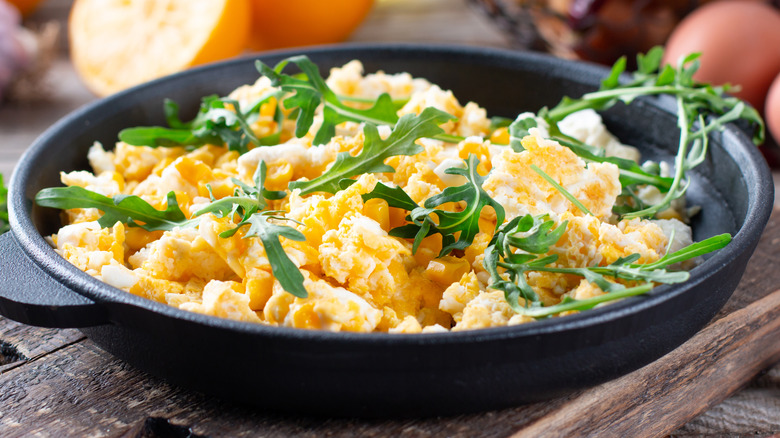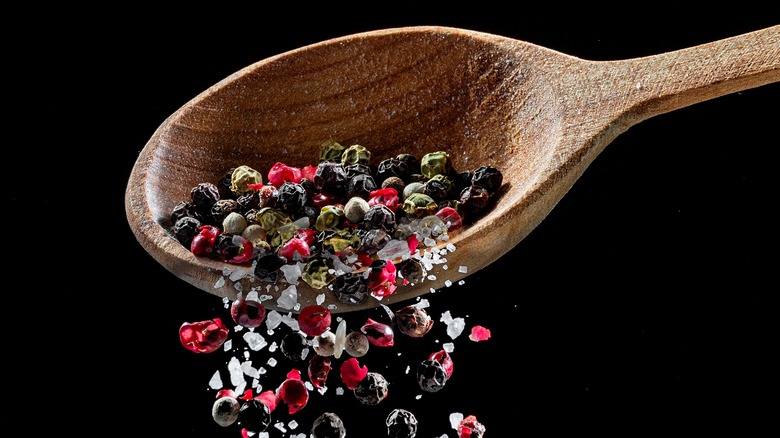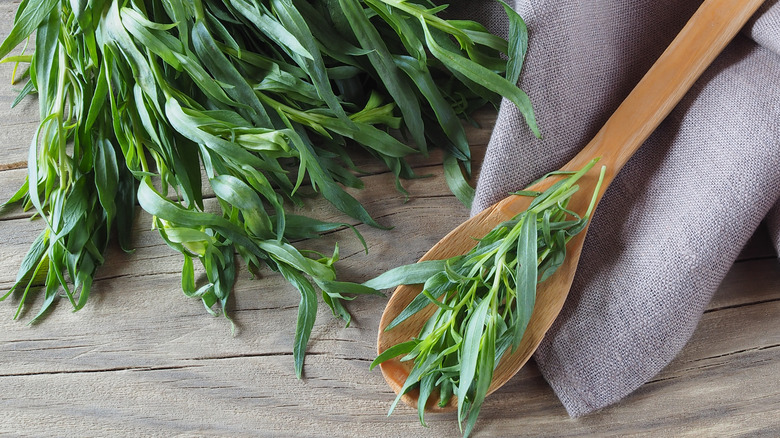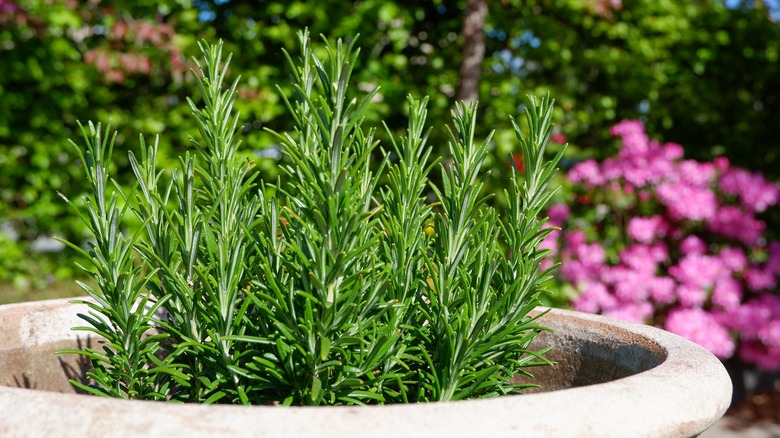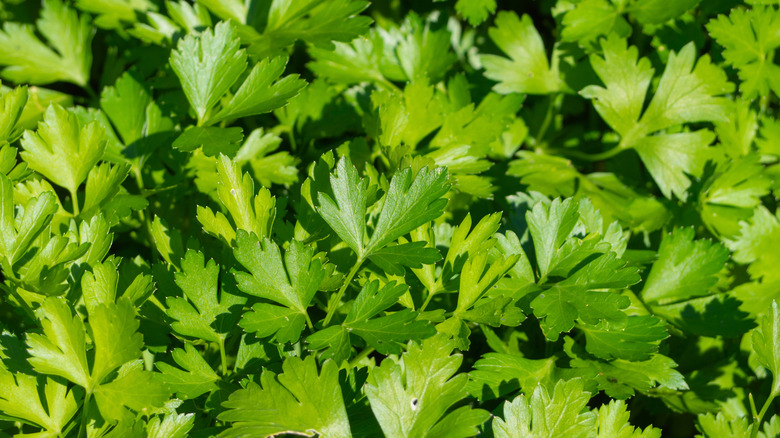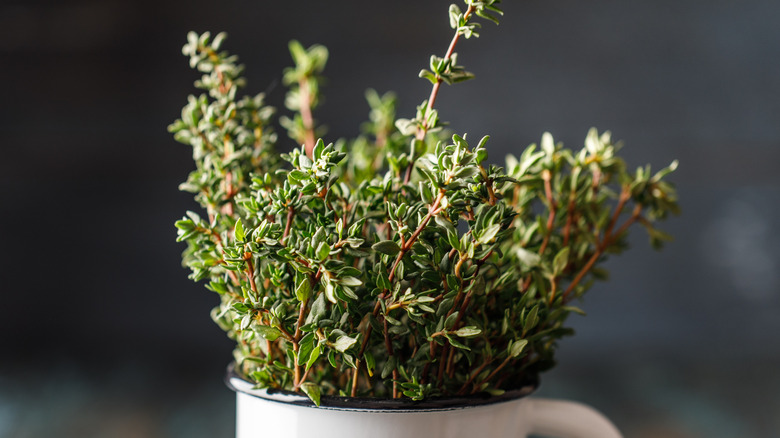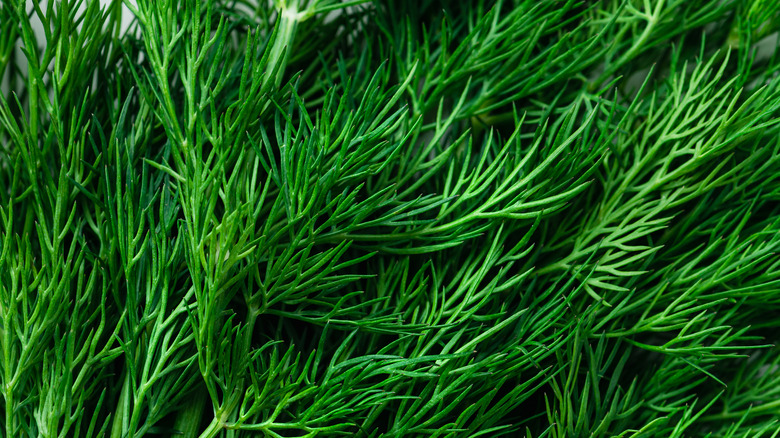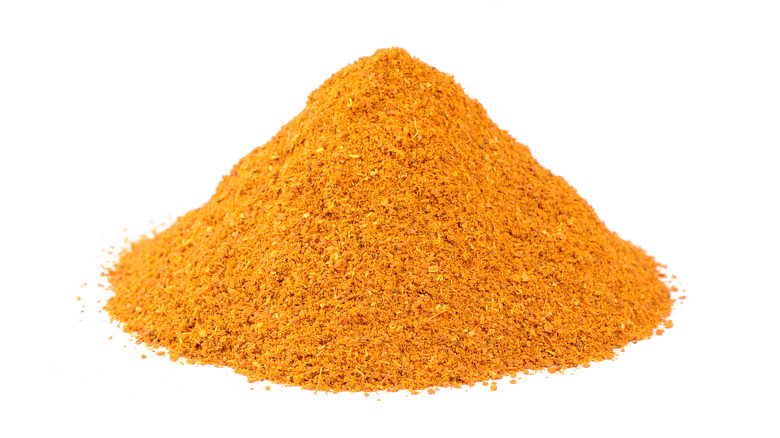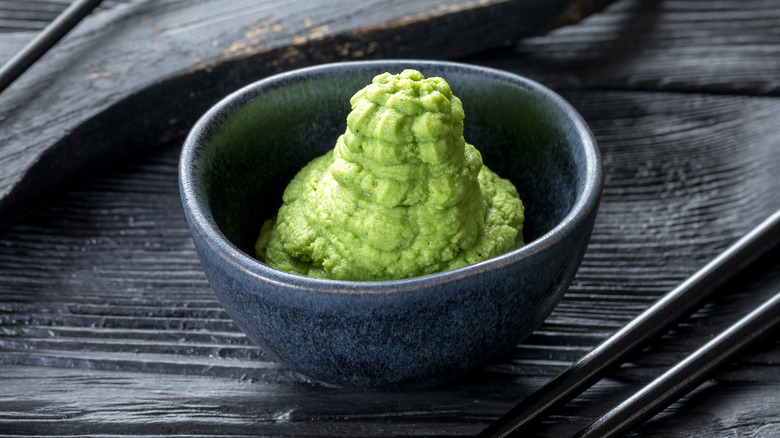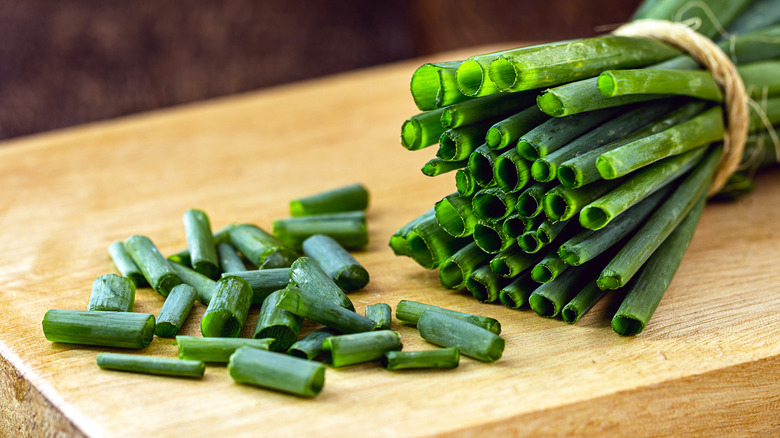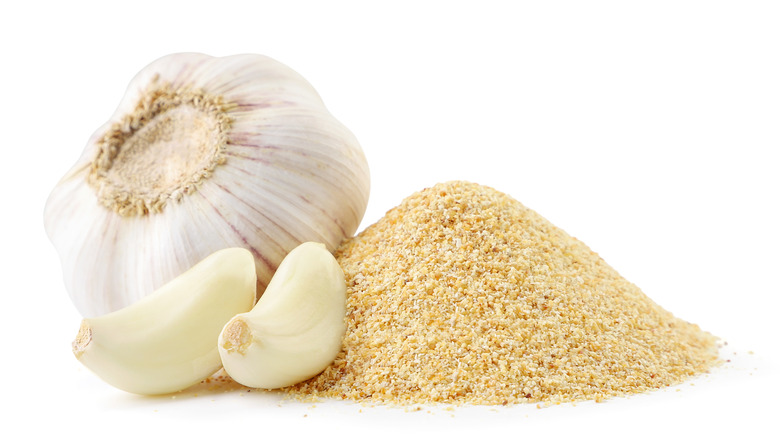The Best Spices And Herbs To Add To Your Scrambled Eggs
If you're reading this, you're probably really loyal to the people you care about. You're a mediator, great at creating safe spaces for people to gather, and even though you're a little bland at times, your people love you for exactly who you are. That may come across as overly presumptuous — but apparently, how you prefer to cook your eggs may reveal some things about your personality (via The Kitchn). This is supposedly how you'll know that you're a true scrambled egg lover among the omelette, fried egg, and poached egg enthusiasts of the world.
Many people have eggs with their breakfast about as regularly as they do their cup of coffee. If you like your eggs scrambled, you probably even have long-standing rituals around how to prepare and season them. Now, if you're keen to challenge the notion that your preference for scrambled egg makes you bland and you want to switch up your scrambling routine, read on to see some of the best spices and herbs you can add to your next breakfast.
Pepper
There's hardly any dish you can prepare that will not be elevated by the punchy flavor of pepper. While black pepper is usually the first to come to mind, there are a few other kinds — most of which are actually just black peppercorns in a different state.
As it turns out, black pepper becomes white when stripped of its skin, red (a rather rare variety) when left to ripen, and green when picked before ripening and cured in brine or vinegar. Pink peppercorns, on the other hand, are surprisingly not pepper, but rather a berry from the schinus molle plant (via Britannica).
Per Slate, black pepper rose to culinary fame after the demand for long pepper — which had become popular among ancient Romans and Greeks for boosting semen and reducing phlegm — far outweighed the supply. Today, it is to salt what jelly is to peanut butter. According to Healthline, various studies have also found that it boasts an array of health benefits like improving brain function and blood sugar, lowering cholesterol, and high antioxidant and anti-inflammatory properties.
Tarragon
According to Horticulture Update, the name tarragon is derived from estragon, a French word meaning "little dragon" that originated from the Arabic term tarkhun. Folk tradition suggests that tarragon got its name from those who believed in its medicinal ability to cure venomous snake bites. Meanwhile, others believe its name was a nod to its snakelike roots.
There are three major groups of tarragon: French, Russian and Mexican. While the Mexican variant is known for being medicinal and the Russian variety for packing more of an aroma than flavor, French tarragon remain the culinary favorite.
While you can use your tarragon dried or fresh, it's suggested that fresh is better for cooking, as it packs more flavor. (Provided, of course, that you give it a thorough rinse before you do so.) Now, the next time you're looking to inject some subtle notes of licorice and citrus into your scrambled eggs, remember that tarragon is exactly the herb for the job.
Rosemary
You may already know that the potent nature of rosemary expands beyond being pleasing to the tastebuds, all the way to the hair and skin. But did you know that it played a vital role in the conception of perfume?
According to the experts at The Perfume Society, rosemary was one of the core ingredients used in Hungary Water, said to be one of the world's first "modern" perfumes. There's quite a range of interesting facts associated with rosemary, like its symbolism in weddings and funerals. It may not be as prominent in burial rites today as it was back when the Egyptians placed it their loved ones' tombstones, but even Shakespeare's Juliet had rosemary in her tombstone. Additionally, ancient Roman brides carried it as a symbol of good tidings for marriage. Rosemary was also used in magic spells to ward off evil, can be grown as a bonsai, and is also known to attract pollinators. Also, if you're really patient, it can even grow taller than you!
A fascinating herb whose tea also boasts an array of benefits for your physical and emotional health, you can use rosemary, either fresh or dried, for your scrambled eggs. However, for a more distinct flavor, you'll want to use it dried, as it retains much of its pungency during the drying process (via Spiceography).
Parsley
As one Quora user boldly asked: "What is the point of parsley?" Answers included using its stalks as a palate cleanser, for the flavor in a host of dishes including stews, soups, salads and sauces, and interestingly, as a meat tenderizer. Some even mentioned what is perhaps its most popular (albeit controversial) use: as garnish.
In 2012, popular MasterChef judge, author, and restaurant critic Ray Rayner declared his own war on the entire notion of garnish. Trolling chefs who pull out a pair of tweezers to garnish masterfully plated dishes, Rayner wrote that they're all "...sprinkled with so much redundant chopped parsley it looks like it's been infected by a virulent mould." Ouch.
While it's not clear whether or not parsley actually does make meat more tender, we do know that it's a versatile and pleasant herb to cook with. Believed to have sprung from Archemorus' blood that spilled when he was devoured by snakes in ancient Greek folklore (via Redlands Daily Facts), fresh parsley sprigs are still pleasing to behold atop salads and dip, even if Rayner vehemently disagrees. Fortunately, though, when it comes to your daily scrambled eggs, the garnish doesn't matter so much when you've got all the flavor packed in.
Thyme
Another exceptionally versatile herb used in chicken, soups, vegetable roasts, stews, and pastas, thyme can be useful in flavoring your scrambled eggs, too. Along with its versatility, thyme is quite hardy. You can enjoy it through every season, whether dried, refrigerated or frozen. Of course, it's imperative to store it correctly. For instance, you can refrigerate it standing in half an inch of water in a glass, pop it in a freezer bag, or simply air dry it (via Spiceography).
Thyme doesn't simply elevate scrambled eggs. In ancient times, thyme was also hailed for its medicinal uses. According to the McCormick Science Institute, ancient Egyptians used it to embalm their dead, while Greeks and Romans used it as an antiseptic back in the day. More recently, 19th century dentists used it for the oral care of patients. Like other herbs which hold some ethereal symbolism, various Roman, European, and Christian traditions held that it could be used to toughen up soldiers or even summon fairies, and that it derived its scent from being the manger at Jesus' birth.
Interestingly, it appears that the only way to really go wrong with thyme would be to use too much of it, because a little goes a long way.
Dill
Fresh, dried, or as seeds, dill is an ingredient with a distinct flavor that will add a touch of playfulness to a wide selection of dishes. Beyond meats, poultry, seafood, vegetables (especially potatoes), sauces, marinades, dips, salads, and of course, pickles, dill will also inject a subtle sweetness to your scrambled eggs if you're feeling like a little extra flair.
According to Healthline, not only is dill super tasty, its nutrient profile may also benefit heart health, blood sugar control, and antioxidants in the cells. Like carrot and celery, dill belongs to the parsley family. Per the New World Encyclopedia, ancient Greeks and Romans held it in high regard for its use in medicine and as a signifier of wealth. And although it's opposite to garlic in that it was believed to aid bad breath, it's similar in that it also has a history of being prescribed for nursing women to help them produce more milk.
Curry powder
Spices may add a ton of depth to what would otherwise be pretty boring and bland food. However, the global spice trade also points toward the impact of settler colonialism.
In Atlas Obscura, Rohini Chaki delves into what the simplified use of the word "curry" in the popular movie "Bridget Jones' Diary" tells us about the British Empire's "willful ignorance" of Indian cuisine. Moreover, the domestication of curry was a significant part of British colonial rule that alienated its custodians, who had to reclaim it as masala. This is a necessary tension to hold around culinary preferences, and to honor the undeniable influence of spices on the global banquet table.
McCormick outlines some surprising ways to use masala in various dishes. You can use the spice as seasoning for your popcorn, as well as to elevate the flavors in your hummus, roasted vegetables, salad dressings, and vinaigrettes. And of course, you can use this to add an extra dash of flavor to your scrambled eggs, too.
Wasabi
It might be commonly served with sushi and sashimi, and you may never have entertained the thought while reaching for various spices and herbs in your pantry. But if you're looking to add a thorough kick to your scrambled eggs, wasabi is precisely the way to do it. Wasabi will surely turn your scrambled eggs into an adventure for your taste buds, but it's also worth noting how and from where it's sourced.
Now grown across China, New Zealand, Taiwan, and the U.S. (via Real Wasabi), wasabi is said to have been originally discovered in a remote village within the Shizuoka region of Japan during the tenth century. The farmer who discovered and then began to grow this notoriously difficult spice supposedly presented it to famed warlord Tokugawa leyasu, who declared it a Shizuoka treasure.
More recently, however, this Japanese treasure, which requires a meticulous environment in which to grow, is reportedly on the verge of a production crisis. Unfortunately, this poses a grave economic and cultural threat to countless family-run businesses that have cultivated it for generations.
Chives
The only plant in the allium family that's native to both the Old and New World ages of exploration, chives are not only some of the tastiest herbs to consume, they're also some of the most useful. Per Rural Sprout, chives attract pollinators, repel pests while attracting other pest-controlling insects, serve as ground cover and a nutrient accumulator that'll help other plants, and are quite pretty, to boot. They also boast an impressive nutrient profile that aids mood and sleep quality, while reducing the risk for some types of cancer (via Medical News Today).
Did you know that the beautiful blossoms found on chives are also edible? Per Backyard Garden Lover, although chive flowers are often used as garnish or to decorate cakes, they can be added to a wide range of dishes, including your scrambled eggs! They are nutritious, make for some pretty dining, and will give your eggs a subtle onion-y flavor. If you especially like your scrambled eggs all buttery, you can make chive blossom butter and have both those flavours running through every mouthful. Yum!
Cayenne
Netting between 30,000 and 50,000 on the scoville scale, cayenne's heat packs a sassy punch to the taste buds. However, it's also a spice that adds flavor and nutrients to any dish, including your morning scramblette.
The star component in cayenne is the very thing that gives it that distinctive punch: capsaicin, which contains many of the health benefits that are often cited in hot peppers (via Healthline). It has signifcant amounts of carotenoids, flavanoids, and vitamin C, thus providing the body with antioxidants that help protect it from diseases, most prominently those associated with the heart.
Furthermore, you may not know that "unripe" cayenne is actually green, that it grows all years, and only really starts to become hot as it matures (via That's It). But if you're a sucker for the spicier things in life, one thing is for sure. Whisking it into your next bowl of cracked eggs will give you a good dose oof protein to start the day, and will also make you heart pump just a little faster.
Garlic powder
You don't need to be a vampire nerd to know that as far as popular culture is concerned, garlic is one of the most powerful tools to ward off Dracula's ilk. There are many theories about why garlic in particular is purported to send vampires packing, but chief among them is the association with its ability to repel against mozzies, which are also persistent little blood suckers (per Garlic Central).
With a history dating as far back as 30 B.C., this unexpected spice that will change your scrambled eggs forever has been praised for possessing potent medicinal properties. According to Herbal Legacy, garlic cloves were mentioned 22 times in Egyptian medical records from about 1,500 B.C. Garlic is mentioned in the Bible as part of the Israelites' diet, and is also found in ancient Babylonian, Medo-Persian, Greek, and Roman literature.
Your breath might turn a tad pungent after your garlicky scramble, but the herb's benefits remain unmatched — and if we're being honest, the bad breath is usually worth it when the taste buds are satisfied, anyway.
